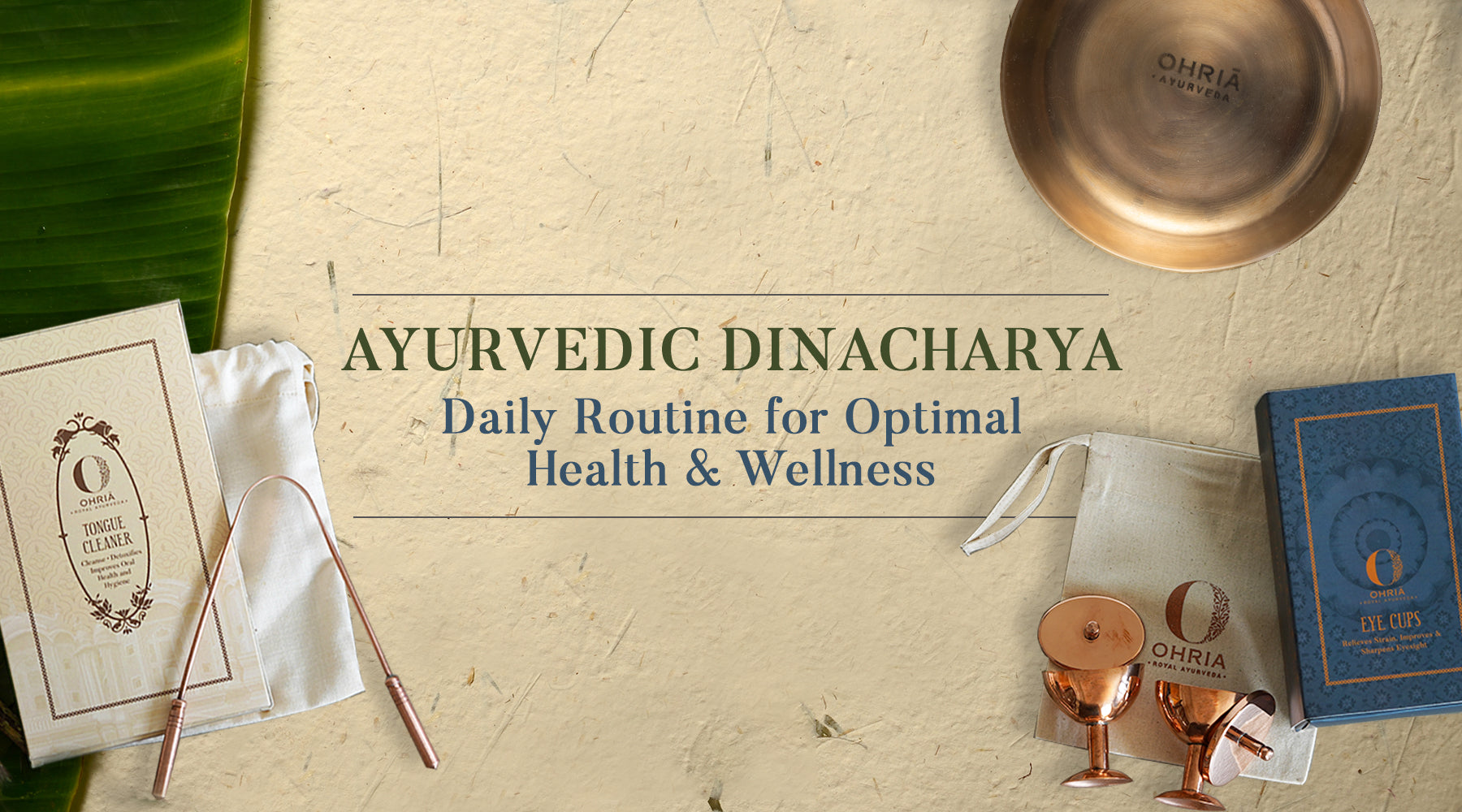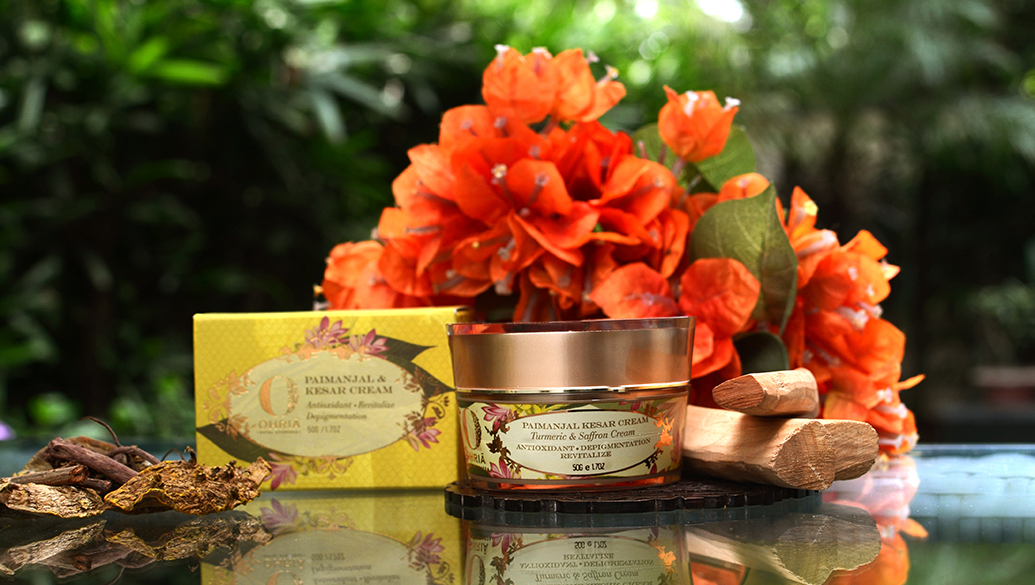Ayurvedic Dinacharya: Daily Routine for Optimal Health & Wellness

Leading a healthy life is a universal goal, with most people wanting to incorporate a routine optimised to their health and wellness needs. To help in formulation of your own routine in a modern world, the Ayurvedic lifestyle, guided by Dinacharya – is a straightforward solution to several common health concerns, aiming for a serene harmony of mind, body, and soul.
Dinacharya, originating from 'dina' (day) and 'acharya' (activity), is an ideal daily routine prescribed by traditional Ayurvedic teachings, promoting self-care through simple daily activities. This routine, in sync with nature, regulates our biological clock, fostering self-awareness. Regularly practicing Dinacharya with care and dedication brings a myriad of health benefits.
This article explores the core principles of Ayurvedic Dinacharya, offering practical insights for weaving this wisdom into our daily lives – a harmonious approach to well-being in our fast-paced world.
Dinacharya in Ayurveda
Ayurveda believes that our well-being is deeply connected to the cycles of nature. Following a routine that aligns with the natural progression of the day is considered crucial for maintaining health, and consistency is key here. Establishing a routine helps regulate bodily functions and promotes a sense of balance and stability.
Ayurveda recognizes the intimate relationship between the mind and body, which is why Dinacharya practices aim to nurture both, fostering truly holistic well-being.
Ayurvedic Dincharya Practices
Morning Routine
- Rise Early
Early morning, known as the 'Brahma Muhurta,' is considered an auspicious time in Ayurveda. Rising during this time aligns the body with the natural energy of the day.
- Tongue Cleaning
A simple yet effective practice, tongue cleaning is believed to remove toxins that accumulate overnight, promoting oral and digestive health. It is a must to use a pure copper tongue cleaner as it is antibacterial as well as antimicrobial.
Also, do not forget to splash some cold water on your face, it will help you stay alert the whole day.
- Oil Pulling
Swishing oil in the mouth for a few minutes, known as 'Gandusha,' not only promotes oral hygiene but is also thought to have detoxifying effects on the entire body. Use Extra Virgin Cold Pressed Coconut Oil if you find it hard to get your hands on the perfect oil and are starting out with building your Dinacharya.
Daily Meals and Eating Habits
- Ideal Meal Times
According to Ayurveda, eating meals at consistent times supports optimal digestion. Decide your everyday meal timings and allow your body to become accustomed to them.
- Mindful Eating
Cultivating awareness during meals, savoring each bite, and chewing thoroughly are essential aspects of Ayurvedic eating habits. Focus on the process of eating is essential for optimum digestion, akin to the focus given to tasks such during work.
Evening Routine
- Meditation and Relaxation
The evening provides an opportunity for winding down. Meditation and relaxation techniques help calm the mind and prepare the body for a restful night. Some may prefer meditating in the morning hours, but evening meditation helps rid the mind and body of the synergies and tiredness of the day.
To create a relaxing atmosphere and cleanse your aura, try our candles to help you unwind after a long day with naturally scented fragrance.
- Digital Detox
A must-do, disconnecting from electronic devices before bedtime promotes better sleep quality and overall well-being. As an extra step, add Netra Shudhi to your evening routine to relax and strengthen your eye muscles before bedtime. It helps in cleansing and reducing the appearance of dark circles. Life-changing in the digital age, many swear by this practice for refreshed eyes after working with screens for long hours.
Go a step further when unwinding after a busy day with our Detox box - this is a great entry point if you are just starting with laying out your Ayurvedic routine. Even if you are a seasoned Ayurveda follower, the curated kit is an easy way of stocking up on your everyday essentials.
Ayurvedic Skin Care
Natural Ingredients in Ayurvedic Skincare
Ayurveda, with its emphasis on natural ingredients, advocates for skincare rooted in nature. Ingredients like turmeric, neem, and aloe vera take center stage in Ayurvedic skin care, offering a gentle yet effective approach to nurturing the skin.
- Cleansing and Moisturizing
Begin with a cleansing ritual using natural ingredients like rose water or milk. Follow it up with a moisturizing routine using Ayurvedic oils, which play a key role in nurturing the skin from within.
- Herbal Face Masks
Create indulgent face masks using Ayurvedic herbs. From revitalizing sandalwood
masks to nourishing honey blends, these DIY, easy to make masks enhance your skin's vitality in a luxurious, Ayurvedic manner.
To save on the time taken to prepare an at-home version, try our range of facial masks that provide all the benefits of the finest natural ingredients and a long shelf-life without the extra steps.
Importance of Dinacharya in Ayurveda
Balancing Doshas
Ayurveda identifies three doshas that govern various physiological and psychological functions. Dinacharya plays a crucial role in balancing these doshas.
- The first step in balancing doshas is understanding your unique constitution or Prakriti. Ayurveda categorizes individuals into different Prakritis, and each person has a unique combination of Vata, Pitta, and Kapha. Knowing your Prakriti helps tailor your Dincharya practices to address the specific needs of your body.
- Ayurvedic Dinacharya is not a one-size-fits-all approach. It involves tailoring daily routines to suit individual doshic imbalances. For example, if your Vata dosha is heightened, you might focus on grounding practices, while excess of the Pitta dosha may require cooling and calming activities.
- The Ayurvedic approach to eating is deeply rooted in dosha balance. For Vata imbalance - favor warm, nourishing foods. Pitta imbalance benefits from cooling and hydrating foods, while Kapha imbalance benefits from light and easily digestible options.
- Incorporating yoga and pranayama (breath control) into your Dincharya routine also helps balance doshas on an inner level.
- Regular detoxification, known as Panchakarma, is a vital aspect of Ayurvedic Dinacharya. This helps eliminate accumulated doshic imbalances. Vamana (therapeutic vomiting) for Kapha, Virechana (purgation) for Pitta, and Basti (enema) for Vata are specific detox methods to balance doshas.
If you’re ever confused about where to start, consulting with an Ayurvedic practitioner can be a great first step. A professional provides personalized insights into dosha imbalances and can help you tailor your Dincharya practices accordingly, ensuring a more effective and targeted approach to achieving doshic balance.
View this post on Instagram
Conclusion - Small Changes, Big Impact
Ayurveda doesn't advise on a complete overhaul of your lifestyle- making simple shifts, like waking up early every day, can bring about profound changes to your mind and body over time. It is most important to stay consistent with a routine to benefit from it. Start with adding simple
tasks to your daily routine slowly till you achieve all aspects of your desired routine. This is the crux of an Ayurvedic Dinacharya, a traditional Ayurvedic way of spending your day.
Contact us to get a personalized Ayurvedic consultation with our team of experienced Ayurvedic Doctors, we will be delighted to assist you.










Leave a comment